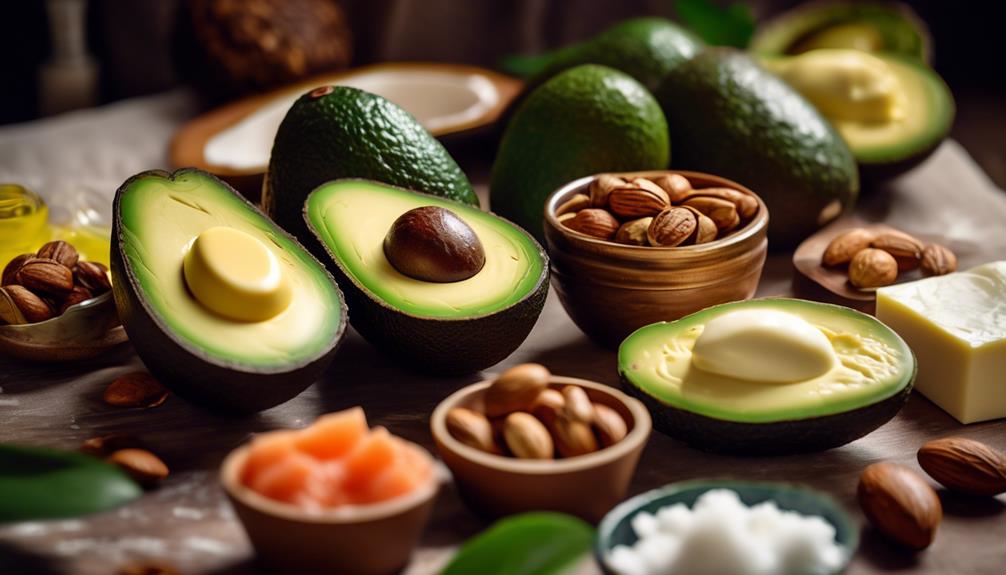Are you aware that a ketogenic diet is a high-fat, low-carb eating plan that has gained popularity due to its potential benefits for weight loss and improved overall health? If you're considering embarking on this dietary journey, it's crucial to understand which healthy fats are best suited for this specific lifestyle.
With an abundance of options available, it can be overwhelming to navigate through the sea of choices. However, fear not, as this discussion will shed light on the top healthy fats that can fuel your ketogenic diet and help you achieve your desired health goals.
Coconut Oil
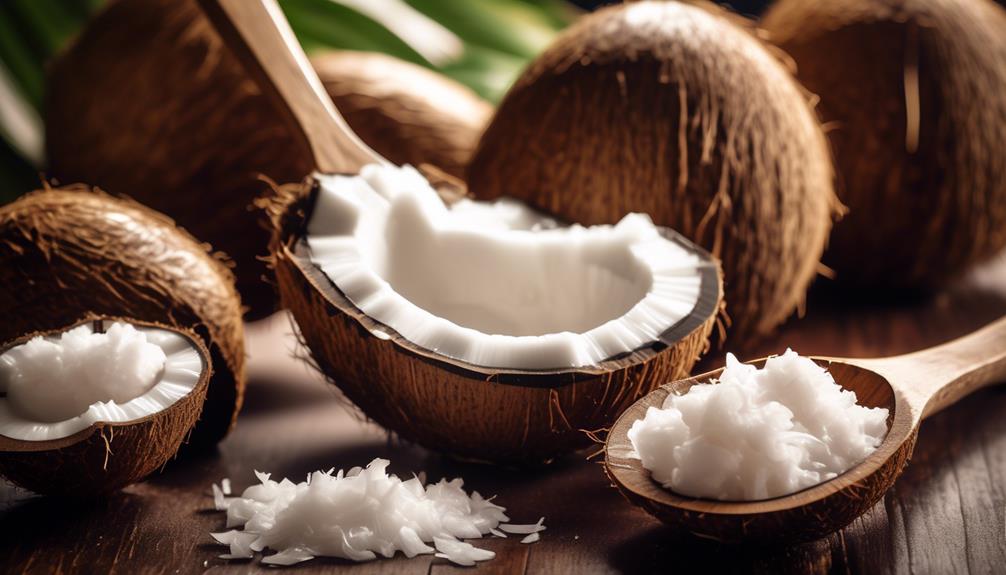
Coconut oil is a staple ingredient for those following a ketogenic diet due to its high content of healthy fats and potential benefits for weight loss. It's rich in medium-chain triglycerides (MCTs), which are easily digested and converted into ketones, the primary source of energy on a ketogenic diet.
These MCTs have been shown to increase satiety, helping you feel fuller for longer and potentially leading to reduced calorie intake. In addition to its weight loss benefits, coconut oil has several other health benefits. It contains lauric acid, a type of fatty acid that has been found to have antimicrobial and antifungal properties. Lauric acid also helps boost your immune system and may help reduce inflammation in the body.
Cooking with coconut oil is also a popular choice for those following a ketogenic diet because it has a high smoke point, meaning it can withstand high heat without breaking down and losing its nutritional value. This makes it suitable for sautéing, baking, and frying.
Avocado
Avocado, a versatile and nutrient-rich fruit, is a fantastic addition to a ketogenic diet. Not only is it delicious, but it also offers numerous health benefits. Avocado is packed with healthy fats, fiber, and important vitamins and minerals. It's a great source of monounsaturated fats, which can help improve heart health and reduce inflammation in the body. These fats also provide a steady source of energy and help keep you feeling full and satisfied.
When it comes to recipes, avocados are incredibly versatile. You can enjoy them sliced on top of salads, mashed into guacamole, or even blended into smoothies for a creamy texture. They also make a great substitute for butter or mayo in various dishes, adding a rich and creamy flavor.
In addition to being a delicious and versatile ingredient, avocados offer several health benefits. They're a good source of potassium, which is essential for maintaining proper muscle function and regulating blood pressure. Avocados also contain antioxidants, such as lutein and zeaxanthin, which are important for eye health.
Grass-Fed Butter

Another healthy fat option to consider for a ketogenic diet is grass-fed butter, which offers its own unique set of benefits.
Grass-fed butter is sourced from cows that have been raised on a pasture-based diet, resulting in a higher nutrient content compared to conventional butter. This type of butter is rich in essential fatty acids, including omega-3 and omega-6, which are important for brain function and reducing inflammation in the body. Grass-fed butter also contains higher levels of fat-soluble vitamins such as vitamin A, D, E, and K2, which are crucial for overall health and wellbeing.
When it comes to cooking with grass-fed butter, it's important to note that it has a lower smoke point compared to other cooking oils. This means that it's better suited for low to medium heat cooking methods such as sautéing and baking, rather than high heat frying.
The rich and creamy flavor of grass-fed butter adds a delicious taste to dishes and can be used as a spread on low-carb bread or added to coffee for a creamy bulletproof-style drink.
Incorporating grass-fed butter into your ketogenic diet not only enhances the flavor of your meals but also provides you with a dose of healthy fats and essential nutrients.
Olive Oil
Olive oil is a healthy fat that offers numerous benefits for a ketogenic diet. It's rich in monounsaturated fats and antioxidants, which can help reduce inflammation and promote heart health.
Incorporating olive oil into your meals can be as simple as using it as a salad dressing or drizzling it over cooked vegetables for added flavor and nutrition.
Benefits of Olive Oil
Are you aware of the numerous health benefits associated with incorporating olive oil into a ketogenic diet?
Apart from being a great source of healthy fats, olive oil also offers several benefits for your hair and skin.
When it comes to skincare, incorporating olive oil can help moisturize and nourish your skin, thanks to its high content of antioxidants and vitamins. It can also aid in reducing inflammation and protecting against UV damage.
Additionally, olive oil has been found to promote hair growth and improve the overall health of your hair. Its moisturizing properties help keep your scalp hydrated, preventing dryness and dandruff. It can also strengthen and condition your hair, leaving it shiny and manageable.
Incorporating Olive Oil
Incorporating olive oil into your ketogenic diet can provide numerous health benefits and enhance the flavor of your meals. Not only is olive oil rich in healthy monounsaturated fats, but it also contains antioxidants and anti-inflammatory properties that can support your overall well-being.
Olive oil isn't only a great choice for cooking, but it can also be used in other ways. For instance, it can be incorporated into salad dressings to add a delicious and nutritious element to your greens.
Additionally, olive oil has been used for skincare for centuries due to its moisturizing and anti-aging properties. So, whether you're using it in your cooking or as part of your skincare routine, olive oil is a versatile and beneficial addition to your ketogenic lifestyle.
MCT Oil
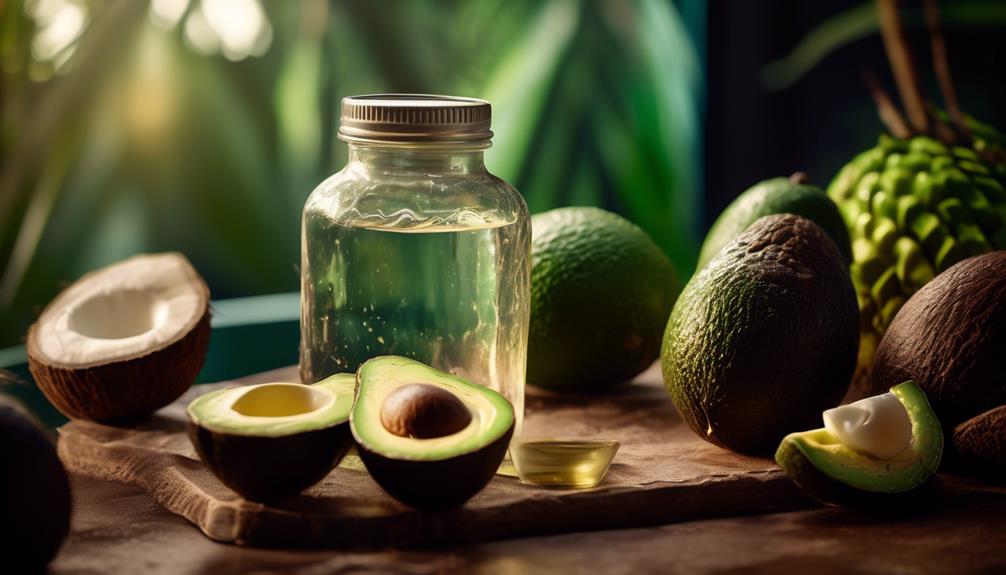
To maximize the benefits of a ketogenic diet, consider including MCT oil as a valuable addition to your daily routine. MCT oil, or medium-chain triglycerides, is a type of fat that's rapidly absorbed and used for energy by the body.
Here are some benefits of incorporating MCT oil into your diet:
- Increased Energy: MCT oil is quickly converted into ketones, providing a readily available source of fuel for your brain and muscles.
- Enhanced Weight Loss: Studies have shown that MCT oil can increase fat burning and promote weight loss, especially in individuals following a ketogenic diet.
- Improved Cognitive Function: MCT oil has been linked to improved brain function, memory, and focus.
Incorporating MCT oil into recipes is easy and versatile. You can add it to your morning coffee for a creamy and energizing boost, use it as a salad dressing, or include it in smoothies for a nutritious and satisfying treat.
Be sure to start with a small amount and gradually increase your intake to avoid any digestive discomfort. So, give MCT oil a try and experience the benefits it can bring to your ketogenic journey.
Ghee
Let's talk about ghee and its benefits for a ketogenic diet.
Ghee, a clarified butter, is rich in healthy fats and has a high smoke point, making it suitable for cooking at high temperatures.
Compared to butter, ghee is lactose-free and has a longer shelf life.
You can easily incorporate ghee into your ketogenic recipes to add flavor and boost your fat intake.
Ghee: Benefits and Uses
Ghee, a clarified butter commonly used in Indian cuisine, offers numerous benefits and versatile uses that make it a valuable addition to a ketogenic diet. Here are some reasons why you should consider incorporating ghee into your daily meals:
- Higher smoke point: Ghee has a higher smoke point than coconut oil, which means it can be heated to a higher temperature without oxidizing and forming harmful free radicals.
- Nutrient-rich: Ghee is rich in fat-soluble vitamins like A, D, E, and K, as well as butyric acid, which has anti-inflammatory properties.
- Enhances flavor: Ghee has a rich, nutty flavor that can enhance the taste of your dishes, making them more satisfying and enjoyable.
To incorporate ghee into your ketogenic diet, you can use it for cooking, sautéing, or as a spread. It can also be a great addition to your bulletproof coffee or used in baking recipes. Experiment with ghee and enjoy its unique benefits and flavors.
Ghee Vs. Butter
Ghee and butter are both popular choices in cooking. However, there are some key differences between the two when it comes to their composition and potential health benefits.
In terms of taste, ghee has a rich, nutty flavor, while butter has a creamy and slightly sweet taste.
When it comes to health benefits, ghee has a higher smoke point than butter, making it a better choice for high-heat cooking methods like frying. Ghee is also lactose-free and contains no casein, making it suitable for individuals with lactose intolerance or dairy allergies. Additionally, ghee is rich in fat-soluble vitamins and butyric acid, which may have anti-inflammatory and gut health benefits.
In terms of cooking versatility, both ghee and butter can be used for frying, sautéing, and baking. However, ghee has a longer shelf life due to its lower moisture content, making it more resistant to spoilage.
Incorporating Ghee Into Recipes
Incorporating ghee into your favorite recipes can add a rich and nutty flavor, while also providing potential health benefits. Ghee, a clarified butter commonly used in Indian cuisine, is a versatile ingredient that can be easily incorporated into various dishes. Here are some ways you can use ghee in your cooking:
- Replace butter or oil in baked goods: Ghee can be used as a substitute for butter or oil in baking. Its high smoke point makes it ideal for creating moist and flavorful cakes, cookies, and bread.
- Enhance the flavor of roasted vegetables: Drizzle melted ghee over roasted vegetables to add a delicious nutty taste and a crispy texture.
- Promote skin health: Ghee is rich in vitamins A, D, E, and K, which are essential for maintaining healthy skin. Consuming ghee can help moisturize the skin from within and improve its overall health.
Incorporating ghee into your recipes not only adds a delightful taste but also provides potential benefits for your skin health. Try using ghee in baked goods or drizzling it over roasted vegetables to enjoy its rich flavor and potential health perks.
Macadamia Nuts
Macadamia nuts are a rich source of healthy fats that can be incorporated into a ketogenic diet. These nuts aren't only delicious but also offer several health benefits. They're high in monounsaturated fats, which have been shown to improve heart health and reduce inflammation. Macadamia nuts also contain antioxidants like vitamin E, which help protect against oxidative stress and promote overall well-being.
When it comes to incorporating macadamia nuts into a ketogenic diet, there are several ways to enjoy them. One option is to simply snack on them raw or roasted for a quick and convenient source of healthy fats. You can also add them to your meals by chopping them up and sprinkling them over salads or incorporating them into keto-friendly granola or energy bars for added crunch and flavor. Another creative way to use macadamia nuts is by turning them into a creamy nut butter that can be spread on keto-friendly bread or used as a dip for vegetables.
Remember to enjoy macadamia nuts in moderation, as they're calorie-dense. However, their nutrient profile and health benefits make them a great addition to a ketogenic diet. So go ahead and include macadamia nuts in your meal plan to reap their delicious and nutritious rewards.
Flaxseed Oil
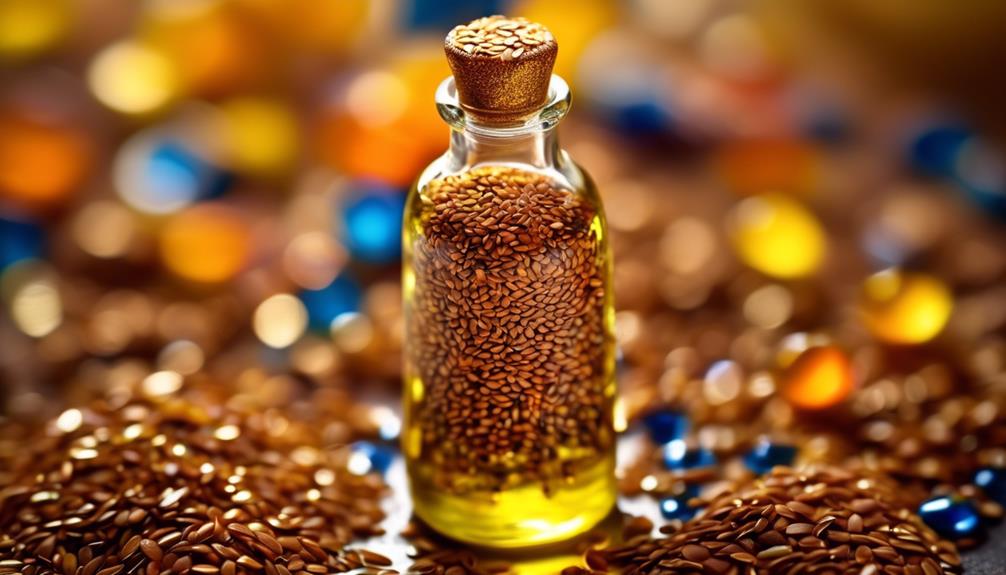
To continue exploring healthy fats for a ketogenic diet, let's now turn our attention to flaxseed oil. Flaxseed oil is derived from the seeds of the flax plant and is known for its numerous health benefits.
Here are some key points to consider:
- Flaxseed oil is rich in omega-3 fatty acids, which are essential for brain health and reducing inflammation in the body. These fatty acids have been linked to a reduced risk of heart disease and may help improve insulin sensitivity.
- Incorporating flaxseed oil into your diet can be beneficial for cooking purposes. It has a low smoke point, so it's best used in dressings, marinades, and as a finishing oil. Avoid using it for high-heat cooking methods as it can break down and lose its nutritional value.
- Flaxseed oil is also a great option for those following a ketogenic diet due to its low carbohydrate content. It contains no net carbs and can be a valuable addition to your high-fat, low-carb meals.
Chia Seeds
Chia seeds, renowned for their nutritional value and versatility, are a great addition to a ketogenic diet. These tiny seeds are packed with fiber, healthy fats, and essential nutrients, making them a valuable ingredient for those following a low-carb, high-fat diet.
One of the main health benefits of chia seeds is their high fiber content. Just one ounce of chia seeds contains a whopping 10 grams of fiber, which is crucial for maintaining healthy digestion and keeping you feeling full and satisfied. Additionally, chia seeds are rich in omega-3 fatty acids, which have been shown to reduce inflammation and support heart health.
Incorporating chia seeds into a ketogenic diet is easy and delicious. You can add them to smoothies, sprinkle them on top of salads or yogurt, or use them as a thickening agent in recipes. Chia pudding is a popular and keto-friendly option, made by combining chia seeds with almond milk and sweeteners like stevia or erythritol. This creamy and nutritious treat can be enjoyed as a breakfast or dessert option.
Hemp Seeds
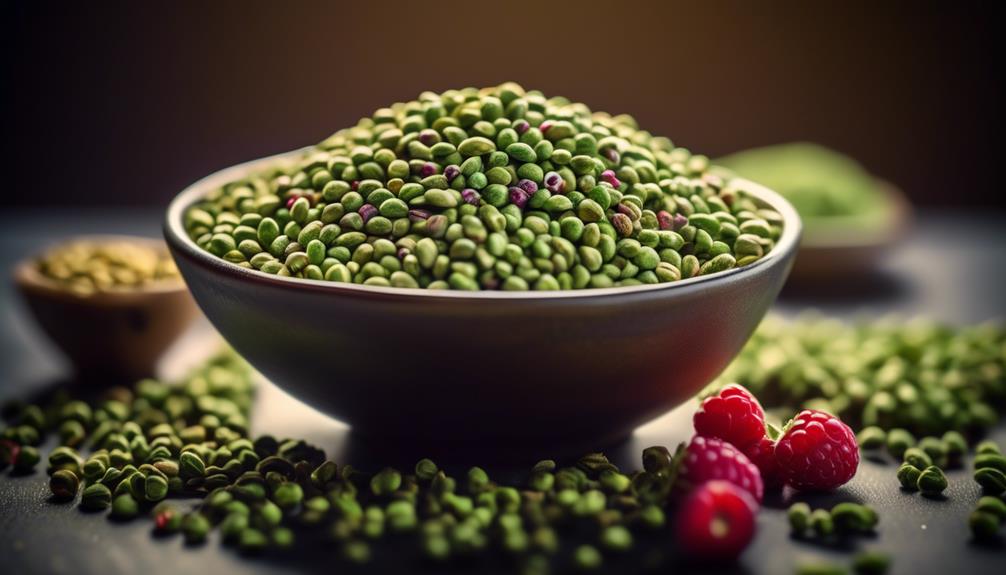
Hemp seeds, known for their nutritional benefits and versatility, are a valuable addition to a ketogenic diet. These tiny seeds are packed with essential fatty acids, protein, and fiber, making them a great choice for those following a low-carb, high-fat diet.
Here are some ways to incorporate hemp seeds into your keto meal plan:
- Hemp seed smoothies: Blend hemp seeds into your favorite low-carb smoothie for a nutritious boost. The seeds add a creamy texture and a nutty flavor, making your smoothie both delicious and filling.
- Hemp seed salad dressing: Create a keto-friendly salad dressing by combining hemp seeds with olive oil, vinegar, lemon juice, and your choice of herbs and spices. This homemade dressing adds a rich and nutty flavor to your salads, while also providing a good dose of healthy fats.
- Snack on hemp seeds: Enjoy hemp seeds as a snack on their own or mixed with other nuts and seeds. They're a convenient and portable option for satisfying your hunger while on the go.
Incorporating hemp seeds into your ketogenic diet can provide you with essential nutrients and healthy fats, helping you to stay in ketosis and maintain optimal health.
Almonds
Almonds, a versatile and nutrient-dense food, can be a beneficial addition to your ketogenic diet. Not only are they delicious, but they also provide a good source of healthy fats. Almonds are rich in monounsaturated fats, which have been shown to help lower LDL cholesterol levels and reduce the risk of heart disease. They're also a good source of protein and fiber, which can help keep you feeling full and satisfied.
In addition to their nutritional benefits, almonds are also low in carbohydrates, making them a great snack option for those following a ketogenic diet. They can be enjoyed on their own as a quick and convenient snack, or they can be added to dishes like salads or stir-fries for added flavor and texture.
When it comes to incorporating almonds into your ketogenic diet, there are a few things to keep in mind. It's important to choose raw or dry-roasted almonds, as flavored or salted varieties may contain added sugars or unhealthy oils. Additionally, portion control is key, as almonds are calorie-dense.
Walnuts
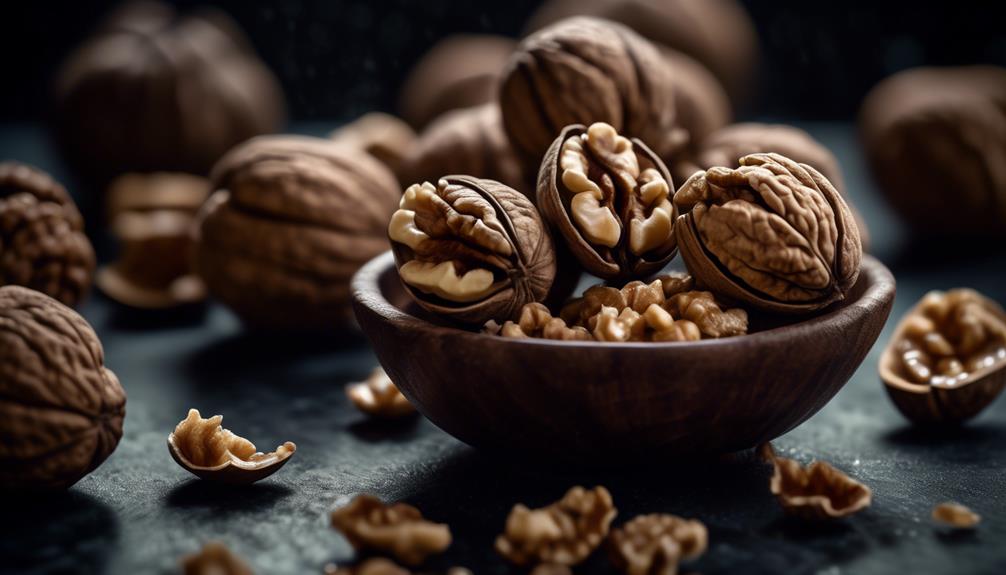
To enhance the nutritional value of your ketogenic diet, consider incorporating walnuts, a nutrient-rich and versatile nut that offers numerous health benefits.
- Walnuts are packed with heart-healthy omega-3 fatty acids, which have been shown to reduce inflammation and improve cardiovascular health.
- They're also a great source of plant-based protein, making them an ideal choice for vegetarians and vegans following a ketogenic diet.
- In addition, walnuts are rich in antioxidants, such as vitamin E and polyphenols, which help protect against oxidative stress and support overall health.
When it comes to enjoying walnuts on a ketogenic diet, there are plenty of delicious recipes to try. You can add them to your salads, sprinkle them on top of roasted vegetables, or even use them as a crust for chicken or fish. Their mild, slightly sweet flavor pairs well with both savory and sweet dishes.
Walnuts come in different varieties, including English, black, and white. Each variety has its own unique taste and texture, so feel free to experiment and find your favorite.
To keep your walnuts fresh and prevent them from going rancid, store them in an airtight container in the refrigerator or freezer. This will help preserve their taste and nutritional value for longer periods of time.
Pecans
Pecans are a nutritious addition to a ketogenic diet. They're rich in healthy fats, fiber, and antioxidants, making them a great choice for snacks or as a topping for salads or desserts.
With their buttery and slightly sweet flavor, pecans can be enjoyed roasted, chopped, or even used as a crunchy coating for meats or fish.
Nutritional Benefits
Pecans offer a rich source of essential nutrients, making them a valuable addition to a ketogenic diet. These nutritious nuts provide several health benefits, including:
- High in healthy fats: Pecans are packed with monounsaturated fats, which have been linked to improved heart health and reduced inflammation.
- Rich in fiber: With approximately 3 grams of fiber per ounce, pecans can support healthy digestion and help maintain a feeling of fullness.
- Abundant in antioxidants: Pecans contain antioxidants like vitamin E and ellagic acid, which help protect against oxidative stress and inflammation.
To maximize the nutritional benefits of pecans in a ketogenic diet, it's important to use proper cooking techniques. Roasting pecans enhances their flavor and texture, while preserving their nutritional value. Avoid high-temperature cooking methods that may damage the healthy fats and antioxidants present in pecans.
Ketogenic-Friendly Snack Ideas
For a satisfying and nutritious snack on a ketogenic diet, consider incorporating pecans into your rotation.
Pecans are an excellent choice for a low carb snack option due to their high fat content and minimal carb content. In fact, a one-ounce serving of pecans contains just 1.2 grams of net carbs, making them a perfect fit for a ketogenic diet.
Pecans also provide a good source of healthy fats, including monounsaturated fats, which have been shown to improve heart health. They're also rich in antioxidants, vitamin E, and minerals such as manganese and copper.
To enjoy pecans as a ketogenic-friendly snack, you can eat them on their own, sprinkle them on salads or yogurt, or incorporate them into homemade low carb snack recipes like pecan butter or pecan-crusted chicken.
Cooking With Pecans
To incorporate the rich flavor and healthy fats of pecans into your cooking, try adding them as a topping to your favorite dishes or using them as a crunchy coating for meats and vegetables. Pecans aren't only delicious but also offer several health benefits.
Here are three cooking techniques to make the most of pecans:
- Roasting: Spread pecans on a baking sheet and roast them in the oven at 350°F for about 10 minutes. This brings out their natural oils and enhances their flavor.
- Chopping: Chop pecans finely to create a nutty crust for fish or chicken. You can mix them with breadcrumbs or spices for added flavor.
- Grinding: Grind pecans into a fine powder and use it as a gluten-free alternative to flour in baking recipes.
Incorporating pecans into your cooking not only adds a delightful crunch and nutty flavor but also provides you with healthy fats, fiber, and essential nutrients like vitamin E and manganese.
Salmon
Salmon is a nutrient-rich, fatty fish that's a staple in a ketogenic diet. It's packed with omega-3 fatty acids, which have been shown to reduce inflammation, improve brain health, and support heart health. In addition to omega-3s, salmon is also an excellent source of high-quality protein, vitamin D, and B vitamins. These nutrients are essential for maintaining optimal health and supporting the body's metabolic processes.
When it comes to cooking salmon on a ketogenic diet, there are endless delicious options. You can grill it, bake it, or pan-sear it with a variety of seasonings and sauces. One popular recipe is lemon garlic butter salmon, where you marinate the fish in a mixture of lemon juice, minced garlic, melted butter, and fresh herbs before cooking it to perfection. Another tasty option is to make a creamy dill sauce to serve alongside grilled or baked salmon.
To add some variety to your ketogenic diet, you can also try making salmon cakes or patties using canned or leftover cooked salmon. These can be seasoned with herbs, spices, and a binder like almond flour or coconut flour before being pan-fried in healthy fats like avocado oil or ghee.
Conclusion
Overall, incorporating healthy fats into a ketogenic diet is crucial for maintaining energy, promoting weight loss, and supporting brain function.
From the creamy richness of avocado to the nutty crunch of walnuts, these fats provide essential nutrients and satisfy cravings.
Like a vibrant palette of colors on a canvas, these fats paint a picture of a well-balanced and nourishing ketogenic diet.
So, go ahead and indulge in these delicious and nutritious options to fuel your body and embrace the benefits of a ketogenic lifestyle.

